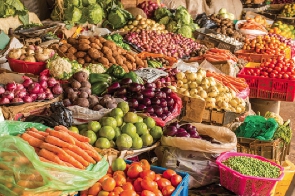You would remember that the NPP government, upon assuming office in 2017, came out with the Planting for Food and Jobs Policy, which was championed by the then Minister for Agriculture, Owusu Afriyie Akoto. This policy brought a lot of relief to Ghanaian farmers, who produced a lot, and there was a lot of food in Ghana from 2018 to 2020, leading to a reduction in food inflation. Food prices went considerably low in Ghana, and this helped the NPP win the 2020 general elections.
With the appointment of the new Minister of Agriculture, Bryan Acheampong, in 2023 due to the resignation of Owusu Afriyie Akoto to contest in the NPP Presidential Primaries, he introduced the phase two PFJ 2.0 program, which is digitally led. It is a great improvement from phase one.
On Wednesday, October 4, 2023, the Ministry of Food and Agriculture advertised a request for expression of interest to engage the services of aggregators, mechanization service providers, and input dealers to provide services for the PFJ Phase 2 program. Phase II of the PFJ is private sector-led. Aggregators have been engaged to provide inputs to farmers, and they will also be responsible for the recoveries.
Agriculture Extension agents were trained and tasked with sensitizing farmers, registering them using their Ghana cards, and mapping their farms as well. About 80% of the people in the Upper West Region are farmers. The farming season started, and there have been so many challenges, especially in the Upper West Region, regarding the implementation of the PFJ 2.0 programme. Some of these challenges include inadequate inputs, late release of inputs, and aggregators in districts they are not familiar with, among others.
As we all know, farming is time-bound, and the early release of inputs is a major success in farming and will also enable these farmers to recover input costs from the government. Out of the 11 districts in the Upper West Region, only four of these districts have received input, and even the inputs received can only take care of less than 1% of registered farmers and the mapped areas.
This has created a major problem in our communities because some farmers who spent a lot of money clearing their lands and hoping that they would have received input by now have been disappointed. Aggregators assigned to these districts are being accused; parliamentary candidates are being accused; and party executives are being accused. In fact, districts that have received some inputs have a very difficult task of dispatching these inputs, Farmers fight
every day at the offices of these aggregators. And we understand that these challenges are not just peculiar to the Upper West Region but to the entire country.
With the unreliable rainfall pattern in the Upper West Region, especially this year, which has made a lot of farmers worried, fertilizer and the use of improved seeds are major necessities for farmers for this cropping season.
It will be recalled that during a recent interview by Minister of Agriculture, Dr. Bryan Acheampong, on Metro TV with Paul Adom Otchere, he made the admission that “the maize from the Sissala land is the best in West Africa; it has been tested, and the results say so.”
Based on this, we, the people of the Upper West Region, wish to plead with the presidential candidate of the New Party, who is also the vice president of the Republic of Ghana, Dr. Mahamudu Bawumia, and the Minister for Agriculture, Dr. Bryan Acheampong, to resolve all issues with the system and get inputs released to us to enable us to produce.
We, the farmers of the Upper West Region, were very happy when we heard of the PFJ 2.0 Phase II program. We knew this was going to go a long way toward reducing the high cost of mechanization and inputs that we are usually confronted with during every cropping season, especially this year.
Also, knowing very well that this is an election year, we will really plead for the immediate release of inputs to prevent most farmers from voting against the party in the region.
Opinions of Thursday, 8 August 2024
Columnist: Iddrissu Muslim



















